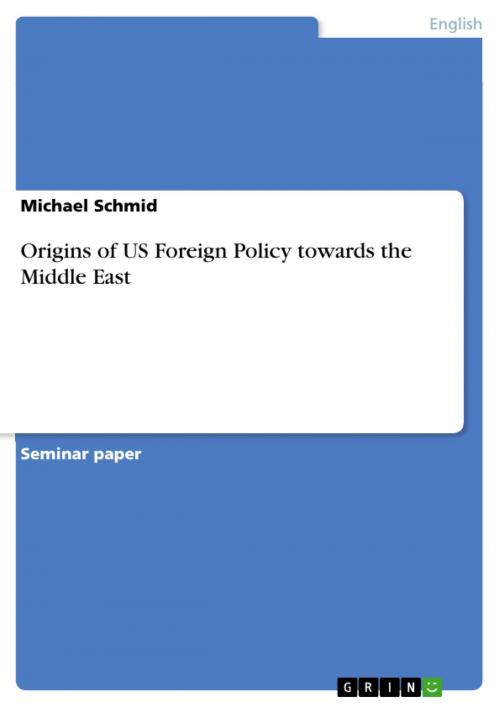| Author: | Michael Schmid | ISBN: | 9783638590907 |
| Publisher: | GRIN Publishing | Publication: | January 12, 2007 |
| Imprint: | GRIN Publishing | Language: | English |
| Author: | Michael Schmid |
| ISBN: | 9783638590907 |
| Publisher: | GRIN Publishing |
| Publication: | January 12, 2007 |
| Imprint: | GRIN Publishing |
| Language: | English |
Seminar paper from the year 2004 in the subject American Studies - Culture and Applied Geography, grade: 1,3, Indiana University (History Department), course: History H 650 ' U.S. Foreign Relations in the American Century', language: English, abstract: Ever since the United States ended the Second World War in 1945 every administration has found itself involved more and more in the affairs of the Middle East. Over the decades this engagement in the orient has changed due to the new realities of the post-World War era and the evolving relations between the USA and Arab nations. Today in 2004, no other foreign policy matter could be more crucial than the issue of United States foreign policy toward the Middle East. After the horrific and tragic terrorist attacks in New York and Washington on September 11th, 2001 the relevance of the issue gained a dramatic new dimension. For decades the US-Arab relation has been the focus of recent scholars, especially the never-ending Israel-Palestinian conflict has had its share of the research that has been conducted. In the first years of the twenty-first century the urgent need to comprehend US-Arab relations is understandably dominant. In the immediate aftermath of the September 11 attacks a wave of historical and scientific works were published. Most of the historians were still in shock from the events that had occurred and therefore not willing to reflect upon past experiences with Middle Eastern nations. But eventually the pressing question arose that puzzled so many minds: Why do they hate us? A project by many respectable scholars involved a website devoted to the American values where they posted several essays in trying to answer that question. By raising it, they automatically came across the path of self-definition and self-defense. As the Bush Administration articulated its first response to the attacks of 9/11 with the retaliatory strike against Afghanistan, the scholars of www.americanvalues.org defended the action by publishing a kind of declaration of self-defense in order to protect the values of America and the values of the free world. In it, they clearly distanced themselves and America from barbaric terrorist attacks and declared that they were meant to destroy American values which led them to answer the next fundamental question: Who are we then? In the end, this proclamation served as a reassurance of the existing belief of what the USA is NOT according to the scholars, which is totalitarian, oppressive, hegemonic and barbaric.
Seminar paper from the year 2004 in the subject American Studies - Culture and Applied Geography, grade: 1,3, Indiana University (History Department), course: History H 650 ' U.S. Foreign Relations in the American Century', language: English, abstract: Ever since the United States ended the Second World War in 1945 every administration has found itself involved more and more in the affairs of the Middle East. Over the decades this engagement in the orient has changed due to the new realities of the post-World War era and the evolving relations between the USA and Arab nations. Today in 2004, no other foreign policy matter could be more crucial than the issue of United States foreign policy toward the Middle East. After the horrific and tragic terrorist attacks in New York and Washington on September 11th, 2001 the relevance of the issue gained a dramatic new dimension. For decades the US-Arab relation has been the focus of recent scholars, especially the never-ending Israel-Palestinian conflict has had its share of the research that has been conducted. In the first years of the twenty-first century the urgent need to comprehend US-Arab relations is understandably dominant. In the immediate aftermath of the September 11 attacks a wave of historical and scientific works were published. Most of the historians were still in shock from the events that had occurred and therefore not willing to reflect upon past experiences with Middle Eastern nations. But eventually the pressing question arose that puzzled so many minds: Why do they hate us? A project by many respectable scholars involved a website devoted to the American values where they posted several essays in trying to answer that question. By raising it, they automatically came across the path of self-definition and self-defense. As the Bush Administration articulated its first response to the attacks of 9/11 with the retaliatory strike against Afghanistan, the scholars of www.americanvalues.org defended the action by publishing a kind of declaration of self-defense in order to protect the values of America and the values of the free world. In it, they clearly distanced themselves and America from barbaric terrorist attacks and declared that they were meant to destroy American values which led them to answer the next fundamental question: Who are we then? In the end, this proclamation served as a reassurance of the existing belief of what the USA is NOT according to the scholars, which is totalitarian, oppressive, hegemonic and barbaric.















